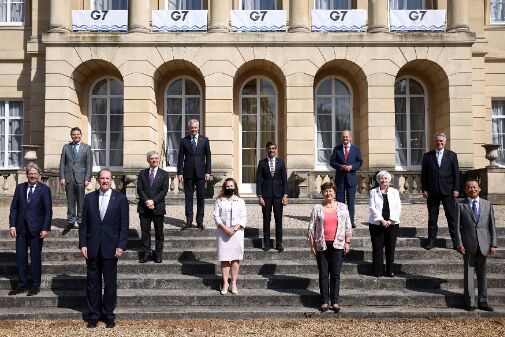
Besides addressing issues like global vaccination, vaccine passport, counterterrorism and economy, the G7 Summit could take a stern stance towards China

“The likely “Policy Priorities” that could be discussed at the Summit include leading the global recovery from coronavirus while strengthening resilience against future pandemics, promoting future prosperity by championing free and fair trade, tackling climate change and preserving the planet’s biodiversity, and championing globally shared values. Some issues will flow from the G7 ministerial meeting which are important from India‘s point of view.”
The G7 Summit between June 11-13 in Cornwall is set to discuss major world issues. As the world’s most influential leaderships prepare to meet at the first in-person meet in two years, a question remains whether the Summit will send a tough message to China.
The Group of Seven (G7) is an informal club of wealthy democracies consisting of the United States, the United Kingdom, France, Germany, Japan, Italy and Canada. It represents 62 per cent of the global net wealth, more than 46 per cent of the global nominal GDP and more than 32 per cent of the global GDP based on purchasing power parity.
The UK, which currently holds the G7 Presidency, has invited representatives from India, Australia, South Korea and South Africa as guest members, indicating that it is serious about pivoting the Indo-Pacific. Prime Minister Narendra Modi will attend the Summit virtually given the Covid situation in India.
The likely “Policy Priorities” that could be discussed at the Summit include leading the global recovery from coronavirus while strengthening resilience against future pandemics, promoting future prosperity by championing free and fair trade, tackling climate change and preserving the planet’s biodiversity, and championing globally shared values. Some issues will flow from the G7 ministerial meeting which are important from India’s point of view.
UK Prime Minister Boris Johnson could call on fellow G7 leaders to make concrete commitments to vaccinate the entire world against coronavirus by the end of 2022. He is expected to call for stepping up the manufacture of vaccines, lowering barriers to the international distribution of vaccines and sharing surplus doses with developing countries. Another issue is that of “vaccine passports”. Earlier this week, UK Prime Minister Boris Johnson had indicated that he would like to push the G7 to look at the possibility of agreeing on the issue of “vaccine passports”. The proposal is intended to ease international travel and would involve recording immunity, vaccination or test in the “vaccine passport”. However, there have been concerns that this could create hurdles for citizens from countries that are unable to increase the pace of vaccination due to manufacturing limitations. India’s Health Minister, Harsh Vardhan, had also expressed his opposition to this idea. He pointed out that there are lower levels of vaccination in developing countries in contrast to the developed countries, and vaccine passport will be hugely discriminatory and disadvantageous for the developing countries. He suggested that implementation of the same be made only after duly addressing the concerns.
The taxation of multinational companies will be yet another important issue. Speaking at the recent meeting of the G7 Finance Ministers, Rishi Sunak, UK Chancellor of the Exchequer said that the world cannot “continue to rely on a tax system that was largely designed in the 1920s”. The G7 Finance Ministers reached an important deal to close cross-border tax loopholes used by some of the world`s biggest companies. This landmark deal aims to squeeze more money out of multinational companies and reduce their incentive to shift profits to low-tax offshore havens. The deal would be discussed at the G7 Summit and later put up before the G20 Finance Ministers meeting on July 9-10, 2021. It could form the basis of a global pact aimed at ending a prevailing trend in which ‘tax haven’ countries have competed to attract corporate giants by offering ultra-low tax rates and exemptions. Rich nations like the G7 have struggled for years to agree on a way to raise more revenue from large multinationals that often book profits in jurisdictions where they pay little or no tax. In terms of this deal, the G7 said it would back a minimum global corporation tax rate of at least 15 per cent, and put in place the measures to ensure that taxes were paid in the countries where businesses operate.
On the issue of counterterrorism, the communique issued after the recent G7 Finance Ministers meeting stated: “Global implementation of the FATF standards for combating money laundering, terror-financing and proliferation financing remains uneven. We recognize the role of the nine FATF-Style Regional Bodies (FSRBs) in assessing and supporting the implementation of the FATF standards around the world.” The G7 Finance Ministers have committed to providing additional expertise and funding to support the FSRB’s assessment programs by at least USD 17 million during 2021-24. From India’s viewpoint, it is a welcome sign that the G7 is devoting attention to terror financing because the abetment and financing of terrorist outfits by Pakistan has shown no signs of abating. An influential grouping like G7 can do much more to rein in the scourge of terrorism.
China is likely to figure prominently in the discussions at the Summit in Cornwall. The communique issued after the Foreign Ministers meeting called on China to participate constructively in the rules-based international system, guided by the principles such as respect for human rights and fundamental freedoms, in context of Xinjiang, Tibet and especially the Uyghurs. Moreover, the PRC was reminded that it is obliged to respect the high degree of autonomy, rights and freedoms of Hong Kong, ‘including those set out in the Sino-British Joint Declaration and the Basic Law’. In terms of economic matters, G7 Foreign Ministers had noted that, as nations that support free and open trade, they expect the fair economic system, trade, investment and capital growth not to be undermined. The PRC was urged to assume and fulfil obligations and responsibilities commensurate with its global economic role. Beijing was also asked to refrain from conducting or supporting intellectual property theft by exploiting cyberspace. Besides, they expressed support for Taiwan’s participation in the WHO and World Health Assembly WHA. They also expressed concern about the situation in the East and South China Seas. India will watch with interest what transpires at the Summit concerning all these important issues.
(Prabhu Dayal is a retired Indian diplomat. He is an author and a commentator, particularly on foreign affairs. A regular panelist at TV channels, he also contributes articles regularly to many publications, including New York based The Indian Panorama. He can be reached at prabhu_dayal70@hotmail.com)




Be the first to comment